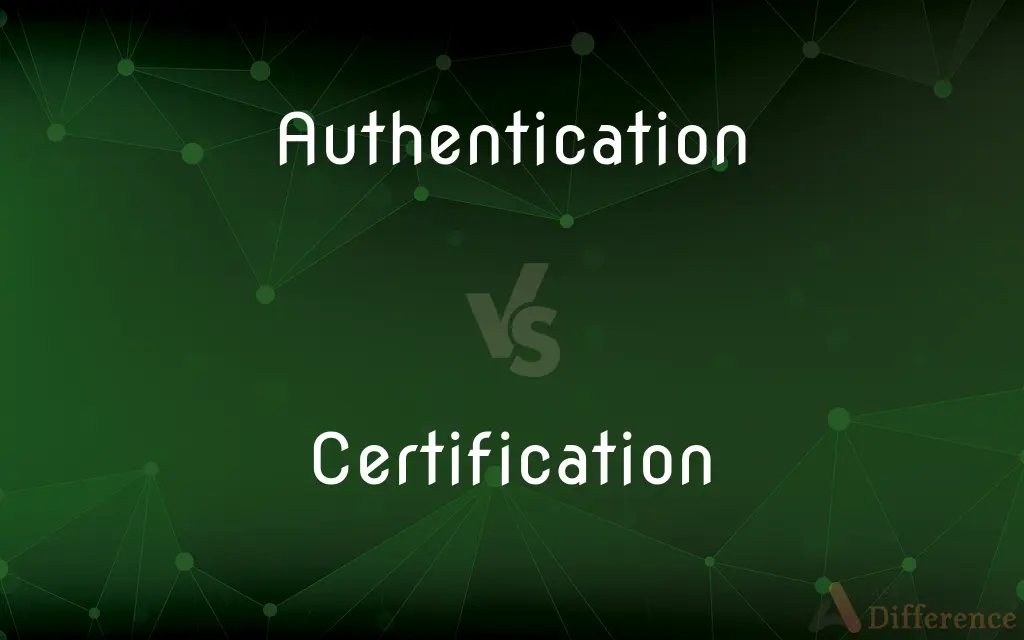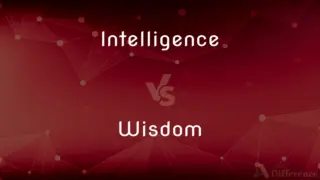Authentication vs. Certification — What's the Difference?
Edited by Tayyaba Rehman — By Fiza Rafique — Updated on March 4, 2024
Authentication verifies identity, ensuring users or devices are who they claim to be, while certification is a formal process validating qualifications, standards, or compliance.

Difference Between Authentication and Certification
Table of Contents
ADVERTISEMENT
Key Differences
Authentication and certification serve different purposes in verifying identity and validating qualifications or standards, respectively. Authentication is a security process used to verify the identity of users or devices to ensure they are who they claim to be before granting access to resources or services. On the other hand, certification is a formal procedure by which an authorized body assesses and verifies that a person, product, or organization meets specific criteria or standards. It often involves passing tests, meeting compliance standards, or undergoing evaluations. Certification is used to validate qualifications, competencies, or adherence to industry standards, providing a level of assurance to employers, clients, or regulatory bodies.
Authentication plays a critical role in digital security, safeguarding personal and corporate data by ensuring that only authorized individuals or devices can access certain information or networks. The complexity and methods of authentication have evolved, from simple passwords to multifactor authentication (MFA), to counter increasing cybersecurity threats. Conversely, certification encompasses a broad range of fields, including professional certifications for individuals, quality certifications for products, and compliance certifications for organizations. These certifications are crucial for demonstrating expertise, maintaining quality, and ensuring safety and regulatory compliance across various industries.
While authentication directly impacts the immediate security and access control within digital systems, certification has a broader impact on professional development, product quality, and organizational reputation. Authentication processes are typically implemented and managed by IT departments or service providers, focusing on protecting access to data and systems. Certification processes, however, are conducted by independent bodies or regulatory agencies, aiming to uphold standards and ensure compliance within a field or industry.
The need for authentication is driven by the ongoing threat of unauthorized access and cyber attacks, making it an essential component of daily digital interactions for individuals and organizations. Certification, while also crucial, is driven by the need for standardization, quality assurance, and professional credibility, often required for career advancement, market access, or legal compliance.
Both authentication and certification are fundamental in their respective domains; authentication ensures secure and authorized access to digital resources, while certification affirms the quality, competency, and compliance of individuals, products, and organizations.
ADVERTISEMENT
Comparison Chart
Purpose
To verify the identity of users or devices.
To validate qualifications or compliance with standards.
Process
Involves passwords, biometric data, security tokens.
Involves tests, evaluations, and compliance checks.
Goal
To protect information and systems from unauthorized access.
To demonstrate expertise, quality, or regulatory compliance.
Implementation
Managed by IT departments or service providers.
Conducted by independent bodies or regulatory agencies.
Impact
Enhances digital security and access control.
Enhances professional credibility, product quality, and organizational reputation.
Applications
Digital systems, networks, online services.
Professional fields, product standards, industry regulations.
Drivers
Need to safeguard against unauthorized access and cyber threats.
Need for standardization, quality assurance, professional credibility.
Examples
Password authentication, multifactor authentication (MFA).
Professional certifications, quality certifications, compliance certifications.
Compare with Definitions
Authentication
Involves various methods for security.
MFA enhances security by requiring both a password and a security token.
Certification
Demonstrates compliance with industry standards.
A product receiving a safety certification before market release.
Authentication
Managed by technical personnel.
IT professionals implement authentication protocols for network security.
Certification
Enhances credibility and quality.
A software developer's certification validates their coding skills.
Authentication
Ensures secure access to digital resources.
Biometric authentication uses fingerprints for secure phone access.
Certification
A formal validation of qualifications or standards.
Earning a professional certification in project management.
Authentication
Protects against unauthorized access.
A company's VPN uses authentication to secure remote access.
Certification
Conducted by authorized bodies.
An independent agency certifies organic products.
Authentication
Something which validates or confirms the authenticity of something
Certification
Can be required for career advancement.
IT professionals seek certifications to advance in cybersecurity roles.
Authentication
A process to verify a user's or device's identity.
Logging into an email account requires password authentication.
Certification
Certification is the formal attestation or confirmation of certain characteristics of an object, person, or organization. This confirmation is often, but not always, provided by some form of external review, education, assessment, or audit.
Authentication
Authentication (from Greek: αὐθεντικός authentikos, "real, genuine", from αὐθέντης authentes, "author") is the act of proving an assertion, such as the identity of a computer system user. In contrast with identification, the act of indicating a person or thing's identity, authentication is the process of verifying that identity.
Certification
The act of certifying.
Authentication
To establish the authenticity of; prove genuine
A specialist who authenticated the antique samovar.
Certification
The state of being certified.
Authentication
Validating the authenticity of something or someone.
Certification
The granting of a certificate.
Authentication
A mark on an article of trade to indicate its origin and authenticity
Certification
A professional qualification that certifies a person's ability.
Authentication
Validating the authenticity of something or someone
Certification
Confirmation that some fact or statement is true
Certification
Validating the authenticity of something or someone
Common Curiosities
What is the key difference between authentication and certification?
Authentication verifies identity for security purposes, while certification validates qualifications, standards, or compliance.
Why is authentication important in digital security?
It prevents unauthorized access to information and systems, protecting against data breaches and cyber attacks.
How does multifactor authentication (MFA) enhance security?
MFA requires multiple forms of verification, significantly reducing the risk of unauthorized access.
What types of certifications are there?
There are professional certifications, quality certifications for products, and compliance certifications for organizations.
Is certification necessary for all professionals or products?
While not always legally required, it can be crucial for professional credibility, market access, and regulatory compliance.
Can certification impact an organization's reputation?
Yes, certifications can significantly enhance an organization's market reputation by demonstrating quality and compliance.
Can a person or product be both authenticated and certified?
Yes, individuals can authenticate their identity for access control, and also be certified in their professional expertise. Products can have secure digital interfaces (authentication) and meet quality standards (certification).
How are certification processes conducted?
Through evaluations, assessments, and compliance checks by independent bodies or regulatory agencies.
How do organizations implement authentication systems?
By deploying security mechanisms like passwords, biometrics, and security tokens through IT infrastructure.
Why might an organization seek certification?
To demonstrate industry compliance, improve product quality, or enhance professional development opportunities.
What benefits do certifications offer to professionals?
They demonstrate expertise, facilitate career advancement, and may be required in certain regulatory or professional settings.
What role do independent bodies play in certification?
They ensure impartiality and adherence to established standards, enhancing the credibility of the certification.
How does the evolution of digital technologies affect authentication?
It necessitates continuous updates and innovations in authentication methods to counteract advanced cyber threats.
How does authentication contribute to cybersecurity?
By verifying identities, it forms the first line of defense against unauthorized access to critical information and systems.
What challenges can arise in authentication?
Technical issues, user inconvenience, and evolving cyber threats can complicate effective authentication.
Share Your Discovery

Previous Comparison
Intelligence vs. Wisdom
Next Comparison
Confection vs. DessertAuthor Spotlight
Written by
Fiza RafiqueFiza Rafique is a skilled content writer at AskDifference.com, where she meticulously refines and enhances written pieces. Drawing from her vast editorial expertise, Fiza ensures clarity, accuracy, and precision in every article. Passionate about language, she continually seeks to elevate the quality of content for readers worldwide.
Edited by
Tayyaba RehmanTayyaba Rehman is a distinguished writer, currently serving as a primary contributor to askdifference.com. As a researcher in semantics and etymology, Tayyaba's passion for the complexity of languages and their distinctions has found a perfect home on the platform. Tayyaba delves into the intricacies of language, distinguishing between commonly confused words and phrases, thereby providing clarity for readers worldwide.
















































